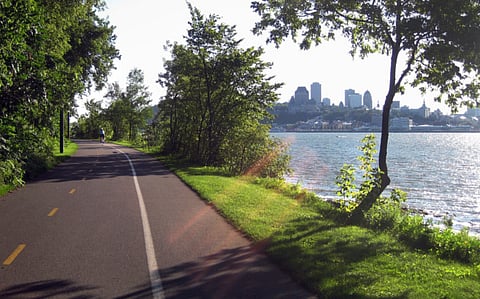Gearing cities for the micro-mobility drive
COVID-19’s fast-tracking cities’ move to more dedicated bicycle lanes and pooling rides

The world has experienced novel challenges and trends in mobility amid the COVID-19.
Dubai too has experienced changes to its mobility landscape too – not only in the airline industry and its role as an international hub - but also on the ground. During March, Dubai launched a movement permit system to combat the spread of the pandemic, decreasing mobility to public transport hubs by 70 per cent, while movement to parks and retail /recreation destinations decreased by 75- and 62 per cent, respectively.
While traditional modes of mobility have been restricted, there has been an increasing focus on alternative methods of moving around the city, with micro-mobility being at the forefront of this movement.
COVID-19 has provided a platform for new micro-mobility opportunities to open across various cities due to their safety, wellness benefits and low-carbon nature. These include temporary or permanent bicycle and pedestrian lanes being established throughout new areas of cities, as well as bicycle highways, low=speed zones and other micro-mobility corridors.
The city of Milan has announced the “Stade Aperte” plan which aims to reposition 35 kilometres of streets and roads originally dedicated for car use into cycling and walking lanes in response to COVID-19.
Spreading out the lanes and rides
Dubai is already ahead of the curve, with existing neighbourhoods, such as Sustainable City, Downtown Dubai and Dubai Marina, being geared for micro-mobility. These neighbourhoods allow residents to be self-sufficient and mobile through the use of alternative transportation modes, coupled with proximity and ease-of-access to a variety of required convenience and lifestyle amenities, such as supermarkets, pharmacies, recreation areas and open spaces.
Careem, the car hailing company, entered the micro-mobility space this year in partnership with Dubai’s Roads and Transport Authority (RTA), launching Careem Bike, the first bicycle pool designated stations, with a multitude of pricing options facilitating daily to yearly subscriptions.
Upcoming master plan communities, such as Dubai Hills Estate, also showcase the forward-thinking urban design possibilities needed to support these up-and-coming modes of transport. Once complete, the pedestrian-friendly master plan will include a 54-kilometre cycle lane, jogging tacks and landscaped walkways.
Crisscross the city
The RTA is also planning to expand Dubai’s cycling lanes to 850 kilometres from the current 316 kilometres, and with more cycling lanes and walking paths, Dubai aims to become the most walkable city in the world by 2030.
Micro-mobility is anticipated to become increasingly popular during COVID-19 and beyond, helping to support the resilience of cities to future shocks, while at the same time promoting sustainability and wellness.
As adoption continues to evolve and grow, cities will need to facilitate these modes of transport with open-minded planning and forward-thinking policies, reimagining spaces to facilitate the movement and health of their citizens.
- Michelle Fraser is Senior Surveyor - Consulting at CBRE.
Sign up for the Daily Briefing
Get the latest news and updates straight to your inbox






